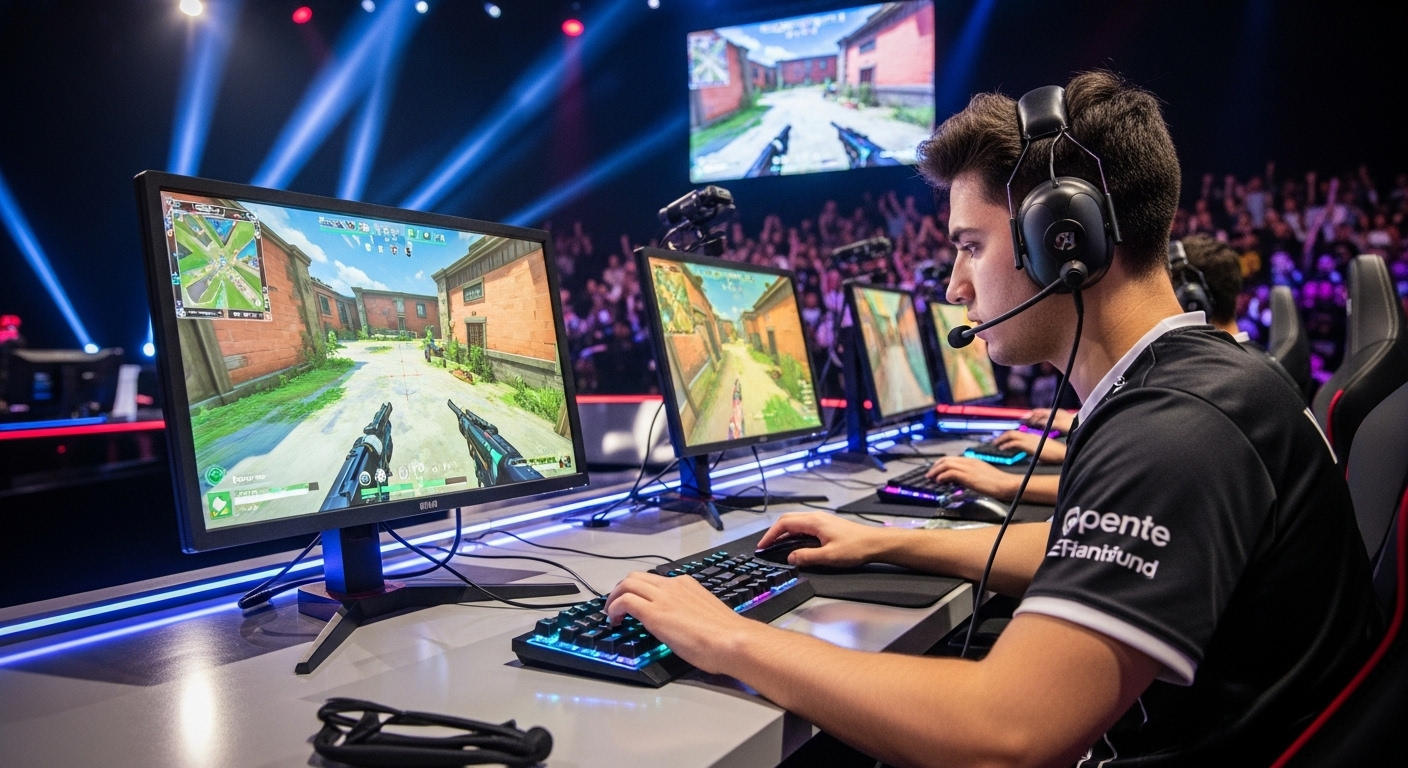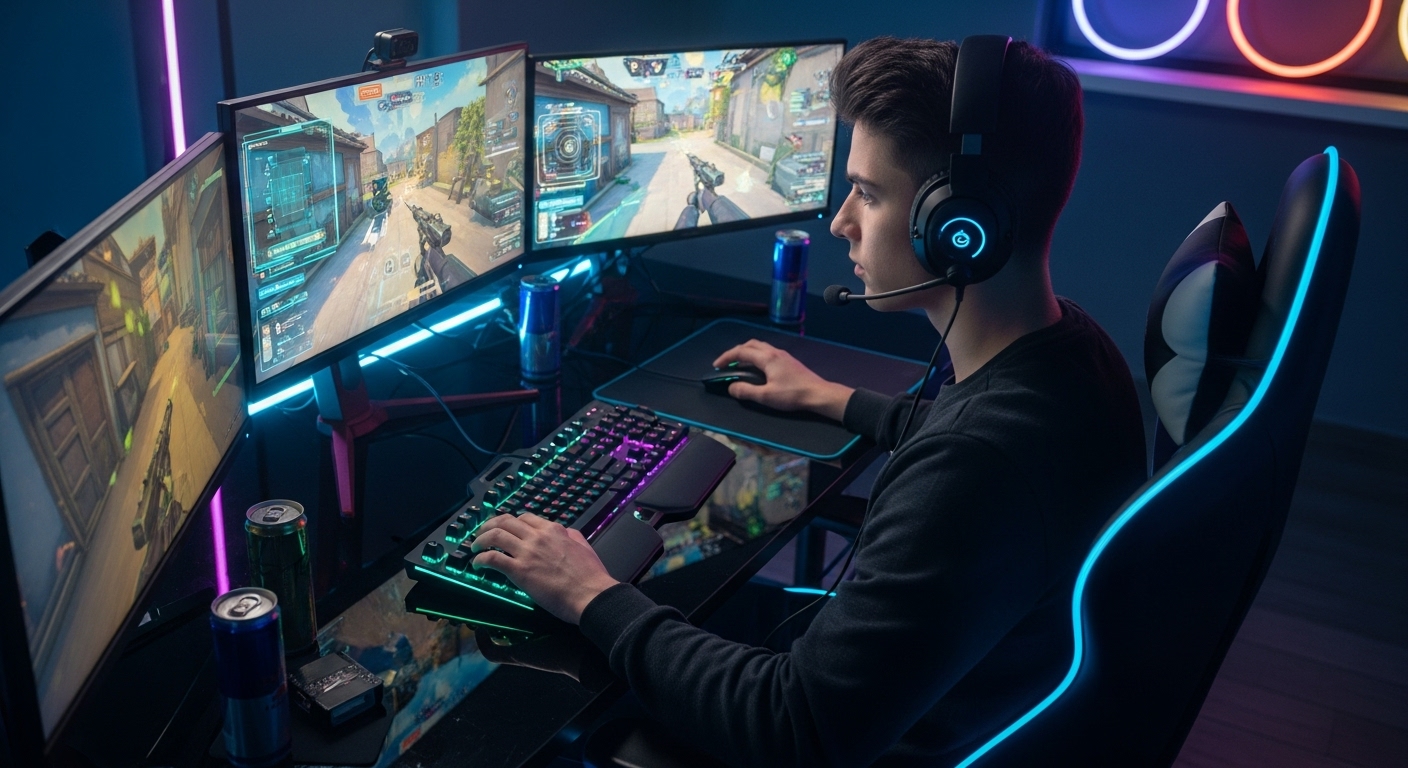Introduction: The World Behind the Screen
Gaming has transformed from a niche hobby into a global cultural phenomenon. What began as simple pixelated entertainment has blossomed into a multi-billion-dollar industry that influences art, technology, social interaction, and even education. Across continents and generations, gaming connects millions, providing immersive experiences that challenge the mind and offer an escape from everyday life.
This blog dives deep into the rich history of gaming, its cultural and technological impact, and the exciting possibilities that lie ahead. From the early arcade cabinets to the rise of esports and virtual reality, gaming’s story is one of constant innovation and endless passion.
The Origins of Gaming: From Pixels to Play
The origins of gaming date back to the 1950s and 1960s, when the first simple computer games were developed as experiments or demonstrations of technology. Titles like “Tennis for Two” and “Spacewar!” laid the groundwork for interactive entertainment.
In the 1970s, arcade machines and home consoles began to capture public imagination. The release of games like “Pong” introduced competitive multiplayer experiences, drawing crowds to arcades and turning gaming into a social pastime.
The 1980s saw the birth of some of the most iconic franchises and characters that remain beloved today. The rise of home gaming consoles such as the Atari 2600 and Nintendo Entertainment System made gaming accessible to a wider audience. The video game crash of 1983 was a significant setback, but it paved the way for industry reinvention.
Gaming Today: A Diverse and Expansive Landscape
Modern gaming is more diverse and expansive than ever. It includes everything from casual mobile games to complex AAA titles that take years and millions of dollars to develop. Genres vary widely, from fast-paced shooters and expansive role-playing games to strategic simulations and interactive storytelling.
The rise of smartphones has introduced gaming to billions of people who might never have owned a traditional console. Mobile gaming offers bite-sized fun for on-the-go entertainment, while powerful PCs and consoles deliver immersive experiences with stunning graphics and intricate gameplay mechanics.
The indie game scene has also flourished, with small teams creating innovative games that challenge traditional ideas. Platforms for digital distribution allow developers to reach audiences directly, leading to a more vibrant and creative ecosystem.
The Technology Behind Gaming: Powering Immersive Worlds
Gaming technology has evolved rapidly, pushing the boundaries of what is possible. Modern consoles and PCs feature powerful processors and graphics cards capable of rendering breathtaking visuals and realistic physics.
Graphics engines like Unreal Engine and Unity provide developers with the tools to create detailed environments, lifelike characters, and dynamic gameplay. Real-time ray tracing, artificial intelligence, and procedural generation techniques contribute to increasingly realistic and responsive game worlds.
Beyond hardware and software, advances in peripherals such as virtual reality headsets, motion controllers, and haptic feedback devices are redefining how players interact with games. These technologies offer new levels of immersion, enabling players to step inside virtual worlds like never before.
Social and Cultural Impact of Gaming
Gaming has become a major cultural force, influencing everything from art and music to language and social norms. It serves as a shared language that transcends geography, age, and background.
Online multiplayer games create communities where players collaborate, compete, and build friendships. Streaming platforms have turned gamers into entertainers and influencers, creating new career paths and fanbases.
Games often explore complex themes, telling stories about identity, morality, and human experience. They challenge players to think critically and make meaningful choices. Many titles also celebrate diversity and representation, providing voices to underrepresented groups.
Gaming culture has its own unique customs, humor, and style, shaping fashion, memes, and social trends. It is a vibrant and evolving community that continues to grow in influence.
The Rise of Esports: Gaming as a Spectator Sport
Esports, or competitive gaming, has emerged as one of the fastest-growing sectors within the gaming industry. Professional players and teams compete in games like League of Legends, Counter-Strike, and Fortnite for substantial prize pools and global recognition.
Esports events draw massive audiences both online and in large stadiums, rivaling traditional sports in viewership. The industry supports coaches, analysts, commentators, and production crews, creating a full ecosystem around competitive gaming.
For fans, esports offers thrilling, high-skill gameplay and a sense of community. For players, it provides opportunities for careers and personal growth. The legitimacy and professionalism of esports continue to rise, blurring the lines between gaming and traditional sports.
Gaming and Education: Learning Through Play
Games have long been recognized as powerful educational tools. They engage players through interactive storytelling, problem-solving, and hands-on experiences.
Educational games can teach subjects ranging from history and science to language and mathematics. They promote skills like critical thinking, creativity, and collaboration.
Gamification, the application of game design elements in non-game contexts, is used in classrooms and workplaces to motivate and engage learners. Virtual reality simulations provide safe environments for training in fields like medicine, aviation, and engineering.
As technology advances, the potential for gaming to transform education grows, offering personalized and immersive learning experiences tailored to individual needs.
The Psychological Benefits and Challenges of Gaming
Gaming offers numerous psychological benefits. It can improve cognitive abilities such as memory, attention, and spatial reasoning. Social games foster cooperation and communication skills. For many, gaming is a source of relaxation, stress relief, and emotional expression.
However, it is important to acknowledge challenges related to gaming. Excessive play can lead to addiction, social isolation, and negative impacts on physical health. Games with violent or toxic content may contribute to aggressive behavior or unhealthy social dynamics.
Parents, educators, and players themselves need to cultivate healthy gaming habits. Setting limits, choosing appropriate games, and maintaining balance with other life activities are key to maximizing benefits while minimizing risks.
The Business of Gaming: Behind the Screens
The gaming industry is a complex business involving developers, publishers, distributors, and marketers. Major companies invest heavily in research and development to produce blockbuster titles that generate massive sales.
Revenue models have evolved beyond simple game purchases. Microtransactions, downloadable content, subscription services, and in-game advertising contribute to ongoing income.
Marketing strategies leverage social media, influencers, and events to build hype and maintain player engagement. Community management is critical to addressing player feedback and fostering loyalty.
The industry faces challenges like piracy, ethical questions around monetization, and ensuring accessibility and inclusivity. Despite this, gaming remains one of the most dynamic and lucrative entertainment sectors worldwide.
Gaming’s Future: Emerging Trends and Possibilities
The future of gaming promises continued innovation and transformation. Artificial intelligence will enable more adaptive and personalized gameplay experiences. Cloud gaming may allow instant access to vast game libraries without high-end hardware.
Virtual reality and augmented reality will continue to blur the lines between the real and digital worlds. Advances in motion capture and brain-computer interfaces could revolutionize interaction methods.
Cross-platform gaming will further unite players regardless of device, creating seamless multiplayer experiences. Blockchain technology and NFTs may redefine ownership and economies within games.
As gaming technology converges with other fields like artificial intelligence, entertainment, and social media, the possibilities for creativity and connection are nearly limitless.
Conclusion: Gaming as a Gateway to New Worlds
Gaming is no longer just a pastime; it is a vibrant and evolving cultural force shaping how we play, connect, learn, and create. From humble beginnings to high-stakes esports, from solitary puzzles to massive online worlds, gaming reflects the diversity and complexity of human imagination.
As technology continues to advance, gaming will open new doors to experiences that inspire and challenge us. Whether you are a casual player, a competitive gamer, or someone curious about this digital frontier, gaming invites you to level up and explore worlds beyond your wildest dreams.



